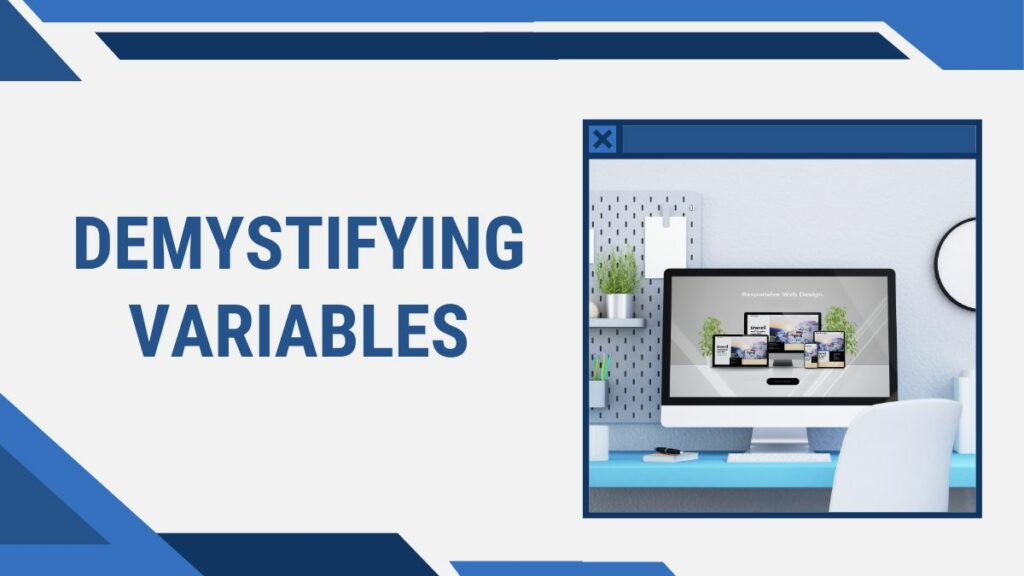Variables are the inherent strength of any programming language. They hold values in locations that can be accessed and modified at will during a program’s running. Working with variables in programming is useful no matter the coder’s experience level, so knowing about them is vital. They allow flexibility in code, making it always adaptable and efficient.
What is a Variable in Programming?
When it comes to programming, we need to understand first what is a variable in programming. It is a symbolic name for a storage place in the computer system where data is accumulated, processed, and retrieved. You can compare it with a tag that gives the programmer the name of a single byte without sharing with him or her the original address of the memory area that holds it.
Variables are the primary method of storing, recalling, and altering information during a program’s processing. They can contain different kinds of data (numeric and textual).
For example, in Python:
x = 10
name = “John”
is_active = True
In this example, x will contain an integer, the name will contain a string, and is_active will contain a Boolean data type. The type of variables makes the coding process more flexible and dynamic.
Types of Variables in Programming
You can comprehend how the variables work in programming when you know the types of variables in programming. Several variables exist in various programming languages to manage each sort of data. A few well-known variables are:
- Integer Variables
These hold whole numbers (positive and negative).
Example: int count = 25; (in C or Java)
- Float Variables
These hold decimal or fractional numbers.
Example: The Price of float = 19.99; (in C or Java)
- String Variables
These hold a group of characters, generally in the form of text.
Example: String message = “Hello, World!”; (in Java)
- Boolean Variables
These variables store true or false values. These are mostly used for control flow.
Example: bool isOpen = true; (in C++)
Different programming languages may have unique types or variations, but the underlying principle remains the same: variables in programming are collections of data that can be referred to and operated throughout the program.
Importance of Variables in Coding
The importance of variables in coding is immense. Without them, attempting to write free-form programs would be almost inconceivable. Think about manually entering values into a program – this would lead to creating redundant and bulky code. The significant feature of variables is that they permit the input and computation of formulae, which can be changed to suit any given condition.
For instance, in a simple calculator program, variables like num1 and num2 contain the user’s input for two numbers. To do this, you have to enter all these numbers, and if you were to change the numbers every time, the code would become cumbersome.
Variables in programming also benefit the readability and maintainability of programs because variables make the system more structured and well-organised. Selecting meaningful variable names gives you an understanding of the code for yourself and the other person who will run or alter the code in the future.
How to Use Variables in Programming?
Using variables properly is one of the most critical primary concepts of programming. Here are a few steps to help you know how to use variables in programming correctly:
- Declaration
To utilise a variable in coding, the variable has to be specified in advance. This step is implicit in certain languages like Python, but in others like Java, it is crucial to specify the variable type before utilising it.
Example: int age; (in Java)
- Initialisation
The specified variable should be initialised, or you must assign or offer a value to it.
Example: age = 25; (in Java)
- Manipulation
A detailed explanation of the variable is that it can be changed, edited, or even used in formulas within the code.
Example: age = age + 1; (in Java)
- Scope
Variables have a scope. This means they are only reachable within the coding unit in question, whether it is a function or block of code. Knowing the scope helps avoid mistakes when referring to variables where they are not visible.
Learning these steps helps you write better code that requires fewer lines of code to be written, is easily readable, and is easy to maintain. If you are learning through a program like PGA, the subject of variables will probably be one of the earliest you will be taught.
Variables in Data Science
Variables are critical in data science, as they work with large quantities of data. Since small metrics are stored in variables, they can store great amounts of data. Hence, variables are an essential part of data management and processing.
For example, in one of the most used languages for data science, Python, variables may hold any number of arrays, matrices, and other structures usually applied within machine learning algorithms or statistical procedures.
Here’s a simple example from a data science course:
import numpy as np
data = np.array([ 1 , 2 , 3 , 4 , 5])
mean_value = np.mean (data)
In this case, data stores the numpy array, and the parameter mean_value stores the mean of the data. This example draws attention to using variables in controlling output data in practical applications.
Conclusion
Variables are one of the most critical components of programming. They enable programmers to store, sort, and access data quickly. As a result, coding becomes flexible and easily expandable. Starting from computation and then analysis of data, variables in programming play an essential role throughout the process. It is, therefore, important to grasp an in-depth idea about variables, whether you are creating applications, studying data science, or taking courses like PGA from Imarticus Learning.

